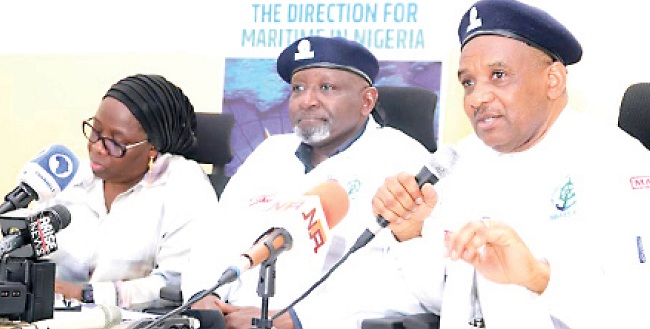[ad_1]
The Federal Ministry of Transportation (FMOT) and the Nigerian Maritime Administration and Safety Agency (NIMASA) has expanded the Nigerian Seafarers’ Development Programme (NSDP) by admitting 435 fresh intakes.
The Director-General of NIMASA,Dr Bashir Jamoh, who disclosed at the flag-off of Batch B of the third NSDP named NSDP-3 (TERRA) in Lagos recently, noted that the training of Nigerian youths to degree level in Marine Engineering, Nautical Sciences and Naval Architecture in some of the best maritime training institutions abroad was to position them to compete effectively in the global maritime industry.
According to him, “At some point, it was said that Nigeria had less than 10 seafarers on ocean-going vessels, while countries like the Philippines had over 400,000, and currently earn over $6 billion in forex inflow from their seafarers employed around the world.
“Countries like India, Indonesia and China also have their nationals all around the world working in the maritime industries. There is hope that with continuous progress made and better projections in the NSDP, Nigeria will soon be among the major players in the global maritime sector.
“It is important to note that from inception to 2020, the programme has enrolled 2,041 students, while 892 are now licensed deck and engine officers, including naval architects, the rest are in their final stage of the programme.
“Also, about 486 of the graduates are now gainfully employed and sailing in both coastal and ocean-going vessels.”
Jamoh explained that satisfied with the above success and the need to drive the government’s policy on youth empowerment further, the ministry and NIMASA approved the expansion of the programme by 435 new intakes.
“While implementing this, we took into account of the encumbrances encountered in the operations of the programme in the last 12 years and ways of eliminating or minimising them; including consideration of a recruitment plan that selects the best candidates into the NSDP.
“Others are spreading beneficiaries across the six geopolitical zones of Nigeria; introducing a code of conduct for all beneficiaries enrolled into the programme to safeguard the image of the country; selection of maritime training institutions that offers the three training elements of the programme (shore-based training, shipboard training and the certificate of competency).
“This is to eliminate the long delay in securing sea time training berths that was experienced with the previous set of students.
“In addition, NIMASA comparatively got the most reasonable cost for the training and in countries of mutual recognition of CoC with Nigeria.
“In the mean time we have recruited 400 new students into the programme and secured admission in two reputable MTIs in Greece and India. The past decade has witnessed an increase in the global trading fleet, partly on account of developments in Asia and other emerging opportunities.”
[ad_2]








